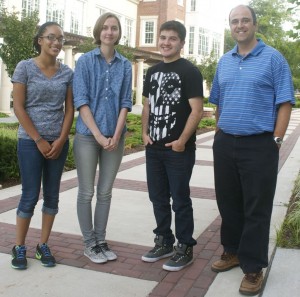The Computer Science Department will be holding the first colloquium of the academic year on Friday, September 5. Dr. David G. Cooper, adjunct professor and instructor of CSC 320: Information Retrieval, will be giving at talk entitled “Affect Detection for a Classroom Computerized Geometry Tutoring System”. Dr. Cooper’s biography and an abstract of his talk can be found below. Please join Dr. Cooper, faculty, and students on Friday in Forcina 408 from 12:30 PM – 1:30 PM. Pizza will be provided and all are welcome to attend.
Abstract:
Minimally invasive sensor technology is mature enough to equip classrooms of up to 25 students with four sensors at the same time while using a computer based intelligent tutoring system. The sensors, which are on each student’s chair, mouse, monitor, and wrist, provide data about posture, movement, grip tension, arousal, and facially expressed mental states. Accurate affect detection can provide an intelligent tutoring system with cues to give feedback to individual students using the system. We discuss a method to clarify classifier ranking for the purpose of affective models. The method begins with a careful collection of a training and testing set, each from a separate population, and concludes with a non-parametric ranking of the trained classifiers on the testing set. The talk will conclude with a discussion of future directions that affective sensing could go for education and beyond.
Bio:
David G. Cooper is a lecturer at Ursinus College in the Math and Computer Science Department and at The College of New Jersey in the Department of Computer Science. He holds an M.S. and a Ph.D. in Computer Science from the University of Massachusetts Amherst. His Ph.D. dissertation focused on computational affect (emotion) detection. He earned his B.S. in Cognitive Science from Carnegie Mellon University. While working as a software engineer at Lockheed Martin, David was on a team to prototype distributed data fusion software for helicopter communication, and was able to test the software while in flight on a Black Hawk helicopter. David’s research has ranged from human robot interaction in the Robot Tug of War project to emotion detection for a computerized geometry tutor for middle and high school students.

